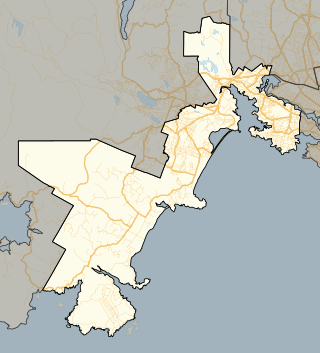The 1871 British Columbia general election was held from October to December 1871. Formerly a British colony, British Columbia became a province of Canada on July 20, 1871. An interim Cabinet was appointed by the lieutenant governor of British Columbia, and election writs for the first general election as a province of Canada were issued to choose 25 members of the first provincial legislature from 12 ridings. These ridings were:

Saanich—Gulf Islands is a federal electoral district in British Columbia, Canada, that has been represented in the House of Commons of Canada since 1988. It is named for its geographical location across the Gulf Islands and Saanich Peninsula in the Vancouver Island region.
Nanaimo was a federal electoral district in British Columbia, Canada, that was represented in the House of Commons of Canada from 1904 to 1979.

Esquimalt-Metchosin is a provincial electoral district for the Legislative Assembly of British Columbia, Canada. It first existed from 1991 to 2009, when it was succeeded by the electoral district of Esquimalt-Royal Roads. The riding was reconfigured and brought back in the 2015 electoral redistribution and was contested again in the 2017 election.
This page shows results of Canadian federal elections on Vancouver Island.
Saanich and the Islands was a provincial electoral district in the Canadian province of British Columbia from 1966 to 1986. Most of the riding is now part of Saanich North and the Islands, while the southern part of the riding is now Saanich South.
The 1875 British Columbia general election was held in 1875. Many of the politicians in the House had served with the Legislative Council or Assembly or the Executive Council, or had otherwise been stalwarts of the colonial era - some supporters of Confederation, others not. Some were ranchers or mining bosses from the Interior, others were colonial gentry from the Island and New Westminster, and others direct arrivals from Britain, Ireland or "Canada", which was still considered a different place not only in the minds of the politicians but in the language used in Hansard during this period.
The 1878 British Columbia general election was held in 1878.
The 1894 British Columbia general election was held in 1894. The number of members remained at 33 with the number of ridings increased to 26 as a result of the partition of the Yale and Westminster ridings.
Robin Mark Richardson is a former Canadian politician and Vancouver Islander separatist/activist who was a Progressive Conservative member of the House of Commons of Canada. He represented the riding of Beaches from 1979 to 1980. He is the founder and current leader of the Vancouver Island Party.

Randall C. Garrison is a Canadian politician. Elected to the House of Commons in the 2011 federal election, he represents the electoral district of Esquimalt—Saanich—Sooke and is a member of the New Democratic Party. He serves as the party's critic for lesbian, gay, bisexual, and transgender issues, succeeding former MP Bill Siksay, and for National Defence. Since becoming an MP, he has introduced legislation to amend the Canadian Human Rights Act and the Criminal Code, return federal environmental protection to the Goldstream River, and lobbied the government to implement an action plan concerning the endangered Southern resident killer whales. A former criminology and political science instructor at Camosun College, Garrison is openly gay and lives in Esquimalt, British Columbia, with his partner, Teddy Pardede.
An electoral redistribution was undertaken in 2008 in British Columbia in a process that began in late 2005 and was completed with the passage of the Electoral Districts Act, 2008 on April 10, 2008. The redistribution modified most electoral boundaries in the province and increased the number of MLAs from 79 to 85. The electoral boundaries created by the redistribution were first used in the 2009 provincial election.

Esquimalt—Saanich—Sooke is a federal electoral district in Greater Victoria, on the southern tip of Vancouver Island in British Columbia, Canada.
An electoral redistribution in British Columbia was undertaken by the BC Electoral Boundaries Commission beginning in 2014 and was formalized by the passage of Bill 42, the 2015 Electoral Districts Act, during the 40th British Columbia Parliament. The act came into effect on November 17, 2015. The redistribution added two seats to the previous total, increasing the number of MLAs in the province from 85 to 87. The electoral boundaries came into effect for the 2017 election. The next redistribution is required to occur following the 2020 British Columbia general election.

Langford-Juan de Fuca is a provincial electoral district for the Legislative Assembly of British Columbia, Canada that was created in the 2008 redistribution as Juan de Fuca out of the ridings of Malahat-Juan de Fuca and Esquimalt-Metchosin. It was first contested in the 2009 general election, in which New Democrat John Horgan was elected MLA.
An electoral redistribution in British Columbia is underway by the BC Electoral Boundaries Commission. On October 21, 2021, the Government of British Columbia appointed Justice Nitya Iyer, Linda Tynan and Chief Electoral Officer Anton Boegman to serve as the 2021 commissioners. Justice Iyer was appointed the chair.